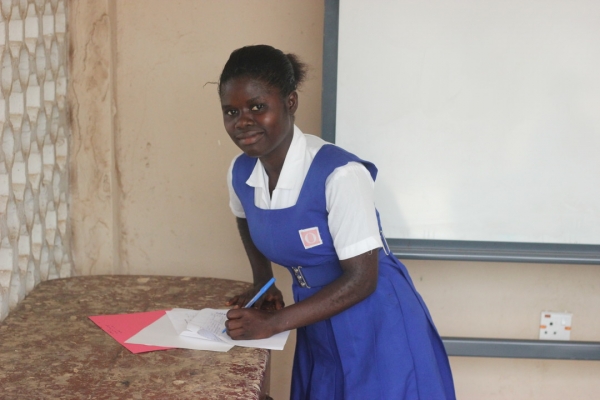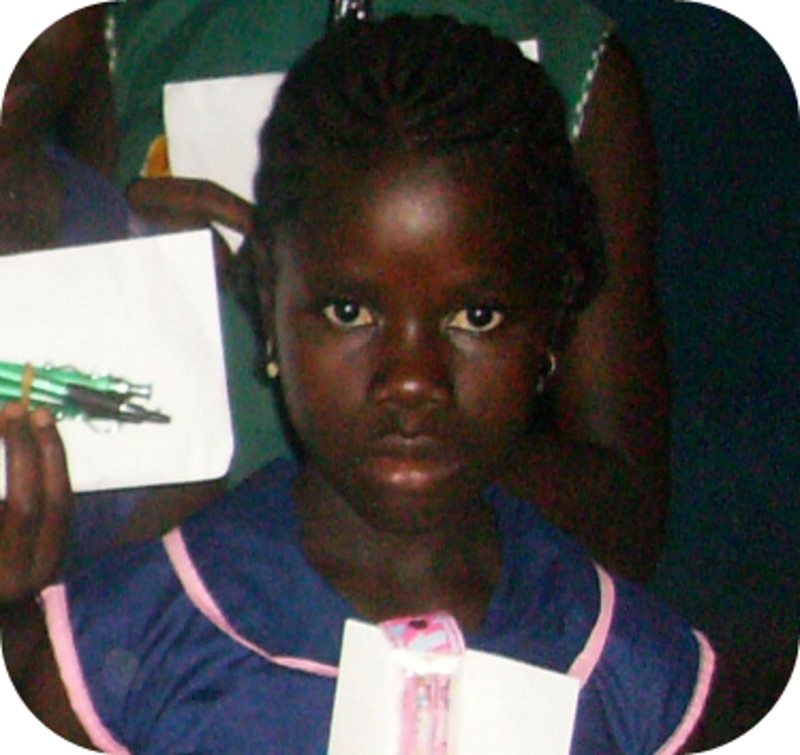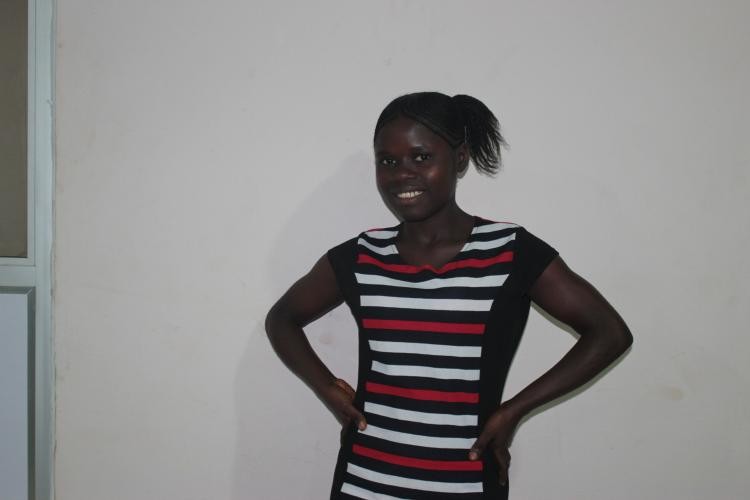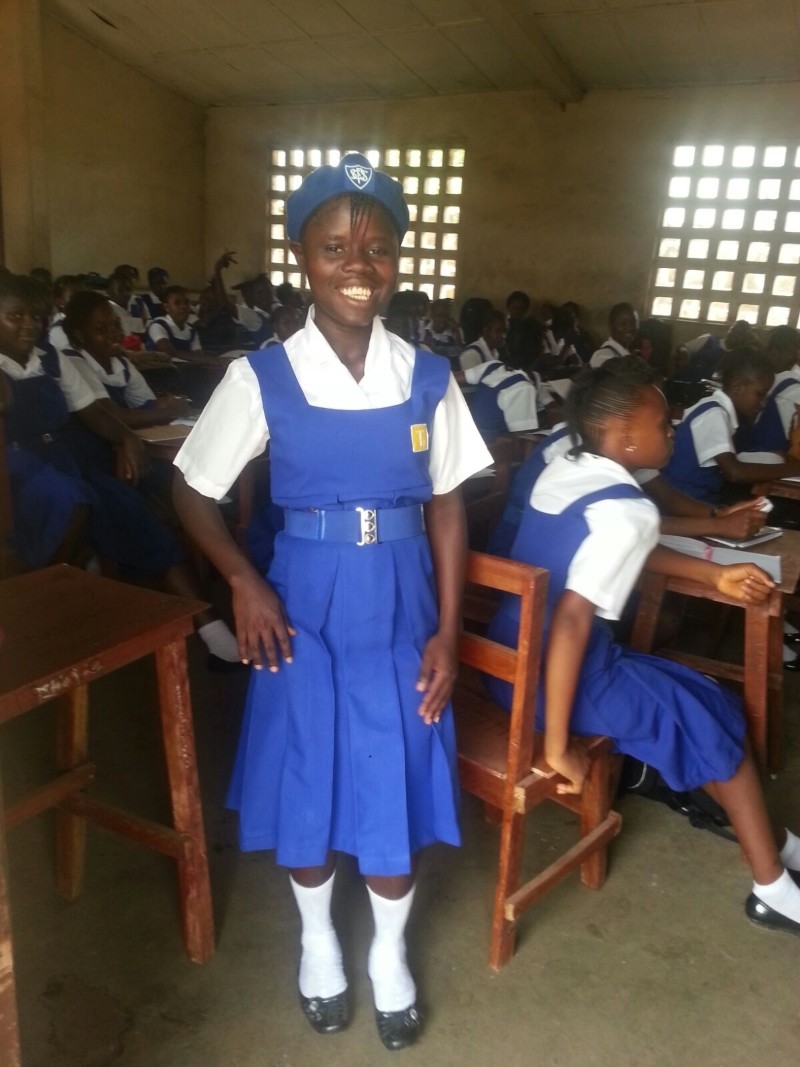
Isata is a sixteen and a half years old young lady from Sierra Leone. Like many of her peers, she comes from a poor homestead. Isata’s father abandoned them when she was young and only her mother fends for her and her five siblings. They live in a slum dwelling and she sells charcoal for a living.
Isata used to sell charcoal alongside her mother, who also did not finish her education. Their economic situation did not allow her to send her children to school. Instead, the children helped at home by fetching water, cooking, and helping clean the house.
Janet, a member of Develop Africa’s board, noticed Isata’s plight. "One day Isata and her mother went to sell charcoal in my compound. At age eleven years, Isata had not started school. Upon inquiry I found out that she was not going to school because her mother could not afford her school fees,” she narrated.
“I asked the mother to enroll Isata in school with the assurance of sponsorship. I enrolled Isata in the Develop Africa sponsorship project," Janet said.

Through this scholarship, Isata has been able to attend school for the past eight years. She has been working hard at school would like to be a nurse when she grows up. Develop Africa is confident that Isata will be a future nurse thanks to generous donors that help support Develop Africa's sponsorship program.
This program provides educational assistance in the form of scholarships to bright but needy students. Solar lights help the students can study at night. Mosquito nets help ensure the children are safe from malaria.
Poverty and literacy have an inverse relationship if poverty is high, literacy is low. In sub-Saharan Africa, there are 76 literate women for 100 adult literate men (Atilola, 2015; Beegle et al., 2016). Indigenous people have lower literacy rates than foreigners because of inadequate access to formal schooling. (John, 2018).
African countries need to come to the conclusion that a key element in fighting poverty is the provision of affordable and high-quality education. This will result in high skilled labor for the development of the continent’s economy.
Most drop-outs end up working in the informal school where there is minimal to no application of reading and writing abilities. In most African countries conventional measures of literacy have yielded higher values than direct testing of literacy. Conventional testing includes the use of national censuses to ask household members if they are literate or not while the direct testing method includes testing of reading and writing skills (Thompson 2015; Zimmerman and Howie 2016).
The Problem with Education in Africa
There is a drive-in most democracies to expand early childhood care and education. Currently, most countries in sub-Saharan Africa failed to achieve universal primary education by 2015.
In addition, the achievement of universal primary education involves a drive to promote gender equality and empower women. Most African countries aimed at eliminating gender disparity by 2005 and no later than 2015 but have failed to achieve it (Prah, 2017). There is an inadequate positive drive in girls’ enrollment in primary (Smith-Greenaway, 2015).
The children from disenfranchised homes are more likely to be excluded. The enrollment is considerably higher for urban children than those living in rural areas (Lucas et al., 2014).
The progress in sub-Saharan countries with very low indicators has shown that school fees charged in most schools are a barrier to school enrollment.
Immigration has also impacted literacy negatively. Most immigrants are refugees running from war-torn countries into mildly stable economies where they increase the burden of illiteracy (Smith, 2015). This includes refugee camps like Dadaab and Kakuma in the Republic of Kenya.
The residents of rural settings also have lower literacy levels than their counterparts in urban settings. Approximately 44% of rural residents have access to education compared to 72% of urban dwellers. This has also been influenced mostly by cultural practices such as child marriages (Nguyen et al., 2014).

Solving the Literacy Challenge in Africa
According to UNESCO’s 1978 definition of functional literacy, i.e. relevant application of cognitive skills of reading and writing, most African economies still lag behind in this respect. Countries such as Kenya which introduced free primary education did not envision the application of the gained skills.
The recommendation as per the goals set out by UNESCO would be to promote the acquisition of universal quality basic education for girls and boys with an emphasis on the empowerment of girl children predicated on social-cultural bias against female education in most African communities.
The reduction of school fees for high school and tertiary education would allow more access to education for rural dwellers and immigrants.
There should also be an emphasis on the health and nutrition of the population to allow the young to focus on education and acquisition of the necessary literacy skills. There should also be partnerships with the private sector and national coordination to enhance youth and adult literacy programs in most sub-Saharan countries.
There is a need for the development of a good school curriculum with emphasis on the acquisition of relevant and applicable skills in the job market with a focus on innovation and technological revolution (Serpell, 2014).
The world is currently in a technological revolution and innovation as opposed to blind rote learning will be important in positioning Africa for the next horizon (Mnkeni-Saurombe, 2015).
Focused, Ongoing Initiatives are Building a New, Stronger and Skilled African Population
The role of Develop Africa is to help stimulate development in Africa. To stimulate development, literacy skills are vital. Literacy is a right enshrined in most constitutions in African democracies. It is the foundation for higher learning (Abubakar, 2015).
Literacy has deep self and communal benefits. It aids in the decrease in poverty in African states that have embraced literacy for all (Easton, 2014). It is a right that is inaccessible to approximately 771 million adults and has been neglected on policy agendas (Welch and Glennie, 2016).
With such focused initiatives, girls like Isata will not only have access to education but will be the building pillars of Africa’s industrialization.
Isata started school in class one at the Saint Thomas Municipal School in 2009. She was always among the top ten pupils in the class. Isata has graduated from Junior Secondary School (JSS) at a well-known school in Freetown.
Isata and her mother are very grateful to Develop Africa and its donors whose sponsorship has made it possible for her to go to school. Isata is working hard in her new school to achieve her goals.
Today, 9 years later, Isata’s dream of becoming a nurse is alive and well. Isata’s future is colorful and bright.

We are thankful for the opportunity to help her achieve her dream. We are excited about the future role that she will play, helping to meet the need for qualified nurses, in post Ebola Sierra Leone.
Join us in providing scholarships and a brighter future for girls like Isata.
References
1. Abubakar, H. A. (2015). Entrepreneurship development and financial literacy in Africa. World Journal of Entrepreneurship, Management and Sustainable Development, 11(4), 281-294.
2. Easton, P. (2014). Sustaining literacy in Africa: Developing a literate environment. UNESCO.
3. Welch, T., & Glennie, J. (2016). OER contributing to early literacy in Africa: Evidence from Saide’s African Storybook.
4. Abu-Fadil, M., Torrent, J., & Grizzle, A. (Eds.). (2016). Opportunities for media and information literacy in the Middle East and North Africa. International Clearinghouse on Children, Youth and Media at Nordicom, University of Gothenburg.
5. Abrami, P. C., Wade, C. A., Lysenko, L., Marsh, J., & Gioko, A. (2016). Using educational technology to develop early literacy skills in Sub-Saharan Africa. Education and Information Technologies, 21(4), 945-964.
6. Prah, K. K. (2017). Language, Literacy, and Knowledge Production in Africa. Literacies and Language Education, 121-132.
7. Smith-Greenaway, E. (2015). Are literacy skills associated with young adults' health in Africa? Evidence from Malawi. Social Science & Medicine, 127, 124-133.
8. Lucas, A. M., McEwan, P. J., Ngware, M., & Oketch, M. (2014). Improving Early‐Grade Literacy In East Africa: Experimental Evidence From Kenya And Uganda. Journal of Policy Analysis and Management, 33(4), 950-976.
9. Murris, K. (2016). Philosophy with children as part of the solution to the early literacy education crisis in South Africa. European Early Childhood Education Research Journal, 24(5), 652-667.
10. Kerfoot, C., & Simon-Vandenbergen, A. M. (2015). Language in epistemic access: mobilising multilingualism and literacy development for more equitable education in South Africa.
11. Anyanwu, R., Le Grange, L., & Beets, P. (2015). Climate change science: the literacy of geography teachers in the Western Cape Province, South Africa. South African Journal of Education, 35(3).
12. Lyons, A., & Kass-Hanna, J. (2018). Financial Inclusion, Financial Literacy and Economically Vulnerable Populations in the Middle East and North Africa.
13. John, P. (2018). Language Teaching and Literacy Learning in Tanzania Primary Education: A Critical Review. Papers in Education and Development, (35).
14. Atilola, O. (2015). Level of community mental health literacy in sub-Saharan Africa: current studies are limited in number, scope, spread, and cognizance of cultural nuances. Nordic journal of psychiatry, 69 (2), 93-101.
15. Nguyen, M. C., Wodon, Q., & Wodon, Q. (2014). Impact of child marriage on literacy and education attainment in Africa. UNICEF and UNESCO Statistics. Washington, DC: The World Bank. Retrieved from http://allinschool. org/wp-content/uploads/2015/02/OOSC-2014-QW-Child-Marriage-final. pdf.
16. Beegle, K., Christiaensen, L., Dabalen, A., & Gaddis, I. (2016). Poverty in a rising Africa. The World Bank.
17. Thompson, R. D. (2015). Philosophy for children in a foundation phase literacy classroom in South Africa: multimodal representations of knowledge (Doctoral dissertation).
18. Smith-Greenaway, E. (2015). Educational attainment and adult literacy: A descriptive account of 31 Sub-Saharan Africa countries. Demographic research, 33, 1015.
19. Zimmerman, L., & Howie, S. J. (2016). Moving from a discourse of access to reading instructional materials to the management and utilisation thereof: Progress in International Reading Literacy Study at Grade 4 in South Africa. Mousaion, 34(2), 31-53.
20. Anyanwu, R., & Grange, L. L. (2017). The influence of teacher variables on climate change science literacy of Geography teachers in the Western Cape, South Africa. International Research in Geographical and Environmental Education, 26(3), 193-206.
21. Obikili, N. (2015). The Impact of the Slave Trade on Literacy in West Africa: Evidence from the Colonial Era. Journal of African Economies, 25(1), 1-27.
22. Serpell, R. (2014). Promotion of Literacy in Sub-Saharan Africa: goals and prospects of CAPOLSA at the University of Zambia. Human Technology: An Interdisciplinary Journal on Humans in ICT Environments.
23. Mnkeni-Saurombe, N. (2015). Information literacy: A cornerstone for open distance learning at the University of South Africa. Journal of Librarianship and Information Science, 47(2), 156-165.
